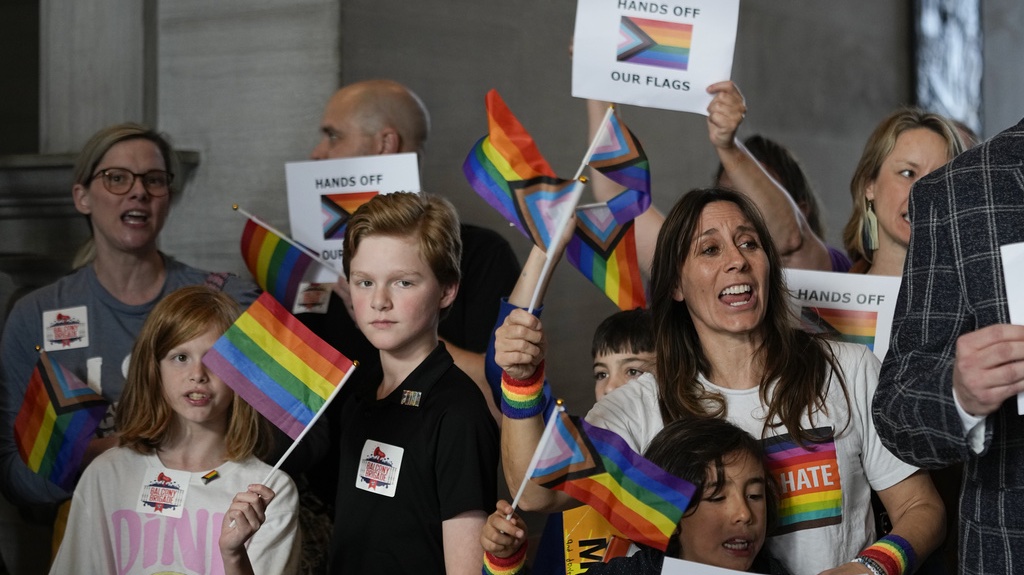
Feb 27
Pride Flags Would be Largely Banned in Tennessee Classrooms in Bill Advanced by GOP Lawmakers
Jonathan Mattise READ TIME: 3 MIN.
A bill that would largely ban displaying pride flags in public school classrooms was passed by the GOP-led Tennessee House on Monday after Republicans cut a heated debate short.
The 70-24 vote sends the legislation to the Senate, where a final vote could happen as early as this week. The motion to cut off debate prompted Democratic Rep. Justin Jones, of Nashville, to yell that House Speaker Cameron Sexton was out of order and ignoring people's requests to speak. Republicans in turn scolded Jones by voting him out of order, halting his immediate comments.
Before that, at least two people against the bill were kicked out of the gallery due to talking over the proceedings as Democrats and other opponents blasted the legislation as unfairly limiting a major symbol of the LGBTQ+ community in schools.
"I am proud when I walk into the public schools in my city, to see the LGBTQ flag in the classrooms, proudly put up by teachers who understand the suffering that many of their students go through," said Rep. Jason Powell, a Nashville Democrat. "We should be welcoming and celebrating our students, not hating on them."
The legislation says "displaying" a flag by a school or employee means to "exhibit or place anywhere students may see the object."
The proposal would allow certain flags to be displayed, with exceptions for some scenarios. Among those approved would be the flags of the United States; Tennessee; those deemed protected historical items under state law; Native American tribes; local governments' armed forces and prisoners of war or those missing in action; other countries and their local governments; colleges or universities; or the schools themselves.
Other flags could be temporarily displayed as part of a "bona fide" course curriculum, and certain groups allowed to use school buildings can show their flags while using the grounds under the bill.
The legislation sets up an enforcement system that relies on lawsuits by parents or guardians of students who attend, or are eligible to attend, public school in a district in question. The lawsuits could challenge the display of flags by a school, employee or its agents that wouldn't fall under proposed criteria for what would be allowed in classrooms.
Republican Rep. Gino Bulso, the bill sponsor from Williamson County south of Nashville, said parents reached out to him with complaints about "political flags" in classrooms. When pressed about whether the bill would allow the Confederate flag to be on display in classrooms, Bulso said the bill would not change the current law about when such a symbol could be shown. He said the bill's exceptions could be applied on Confederate flags for approved curriculum and certain historical items that already cannot be removed without extensive state approval.
"What we're doing is making sure parents are the ones who are allowed to instill in their children the values they want to instill," Bulso said.
The proposal marks another development in the ongoing political battle over LGBTQ+ rights in Tennessee, where the state's conservative leaders have already moved to restrict classroom conversations about gender and sexuality, ban gender-affirming care and limit events where certain drag performers may appear.
The Senate's version of the bill would be more restrictive about who could sue over a flag, limiting it to that specific school's students, parents or guardians of those students or employees there.
Earlier this month, the American Civil Liberties Union sent a letter to town, school, and school district officials who have implemented or are considering flag bans or other pride displays. The group warned that under First Amendment court precedent, "public schools may prohibit private on-campus speech only insofar as it substantially interferes with or disrupts the educational environment, or interferes with the rights of other students."
Bulso contended that displaying the pride flag does not constitute protected free speech for school employees.







